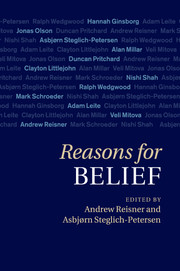Book contents
- Frontmatter
- Contents
- Contributors
- Preface
- Introduction
- PART I NORMATIVE REASONS FOR BELIEF
- 1 How to be a teleologist about epistemic reasons
- 2 Is there reason to be theoretically rational?
- 3 Epistemic motivation
- 4 Error theory and reasons for belief
- 5 Can reasons for belief be debunked?
- PART II REASONS AND EPISTEMIC JUSTIFICATION
- References
- Index
3 - Epistemic motivation
Towards a metaethics of belief
Published online by Cambridge University Press: 05 July 2011
- Frontmatter
- Contents
- Contributors
- Preface
- Introduction
- PART I NORMATIVE REASONS FOR BELIEF
- 1 How to be a teleologist about epistemic reasons
- 2 Is there reason to be theoretically rational?
- 3 Epistemic motivation
- 4 Error theory and reasons for belief
- 5 Can reasons for belief be debunked?
- PART II REASONS AND EPISTEMIC JUSTIFICATION
- References
- Index
Summary
INTRODUCTION
Present-day epistemology abounds in normative talk. The talk is distinctive insofar as it concerns beliefs rather than actions. But on the face of it, it sounds just like metaethical talk: we think about epistemic reasons, we quarrel about epistemic norms and virtues; we celebrate the Value Turn; we sport an ethics of belief. Not only do epistemologists extensively use metaethical vocabulary, but they have become increasingly concerned with analysing epistemic normative talk in light of some standard metaethical questions. They have been forging, in other words, what we might call ‘a metaethics of belief’.
The ongoing debate about the justification of epistemic normativity, and the derivative debate about whether there are any categorical epistemic norms and reasons, are clear examples of epistemologists engaged in a metaethics of belief. Another is the fledgling literature on the nature of epistemic normative judgements. Terence Cuneo (2007), for example, has recently argued for cognitivism and realism about these judgements. And two of the contributors to this volume – Olson and Shah – are concerned with error theories about epistemic judgements, and so are also at work on a metaethics of belief.
Despite helping themselves to the metaethicist's vocabulary and sharing some of his concerns, however, epistemologists have been curiously uninterested in applying particular well-rehearsed metaethical questions to epistemology. Two such questions concern motivation: how should we understand epistemic motivation? and what is the relationship between making an epistemic normative judgement and being motivated by it?
Keywords
- Type
- Chapter
- Information
- Reasons for Belief , pp. 54 - 74Publisher: Cambridge University PressPrint publication year: 2011
- 4
- Cited by

